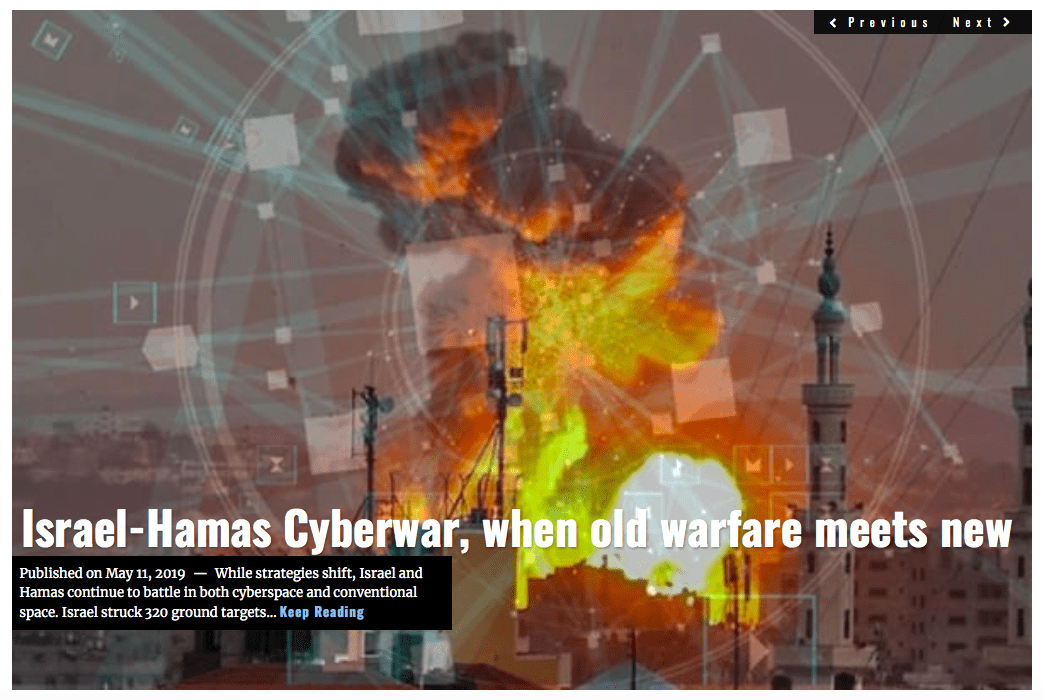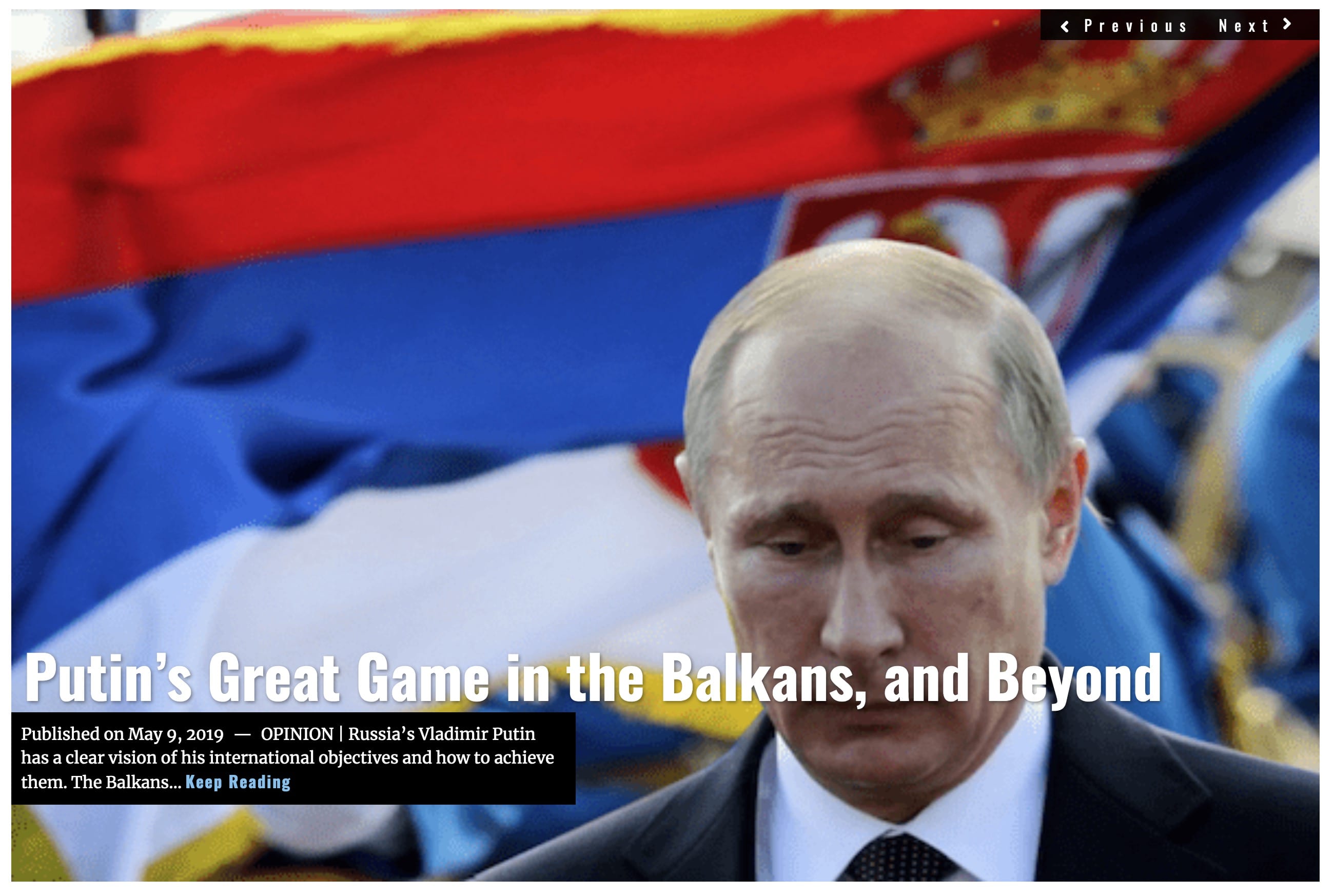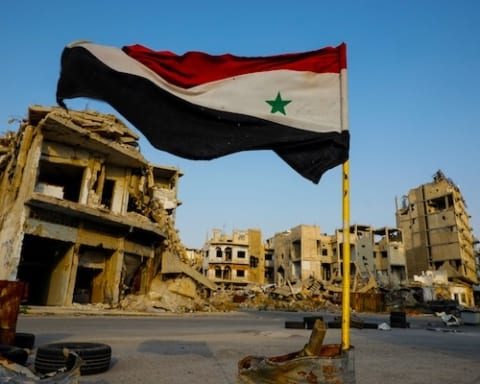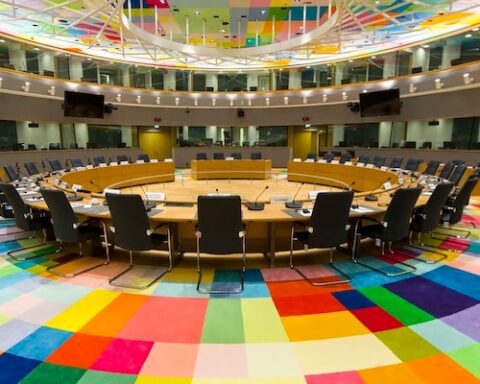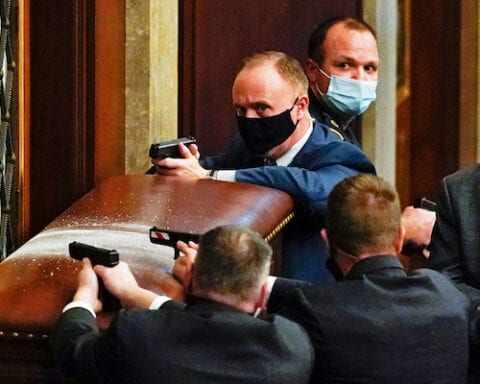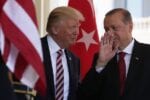A harsh reality is that the Syrian revolution is an abject failure. Nothing will rescue the dream of Syrian democracy. It’s time for radical policy initiatives, even distasteful ones, to stop the needless slaughter of countless innocents. It’s time for realpolitik. It’s time for an “ugly peace.” OPINION by John Sjoholm and William Stuebner.
Eight years, the Syrian Civil War has dragged on at the cost of hundreds of thousands of casualties. The conflict has been characterized by widespread atrocities, torture and murder in government-operated prisons, and the relentless bombing of hospitals and civilian targets. The war has seen the rise and fall (at least in terms of territorial control) of the Islamic State, the extreme radicalization of many opposition groups, and the intervention of numerous foreign players.
If not for the support of Russia and Iran, the so-called Damascus coalition, the Damascus government under Bashar al-Assad would have been dismantled long ago. This, coupled with the betrayal, or worse yet, the indifference of Western countries has led to a situation where approximately 3.9 million people are trapped in northwestern Syria with their backs against the wall.
Turkey, with around 3.4 million Syrian refugees, has closed its borders. Lebanon, a nation teetering on the edge of its own internal security crisis with one-fourth of its population now consisting of Syrians, is incapable of accepting more refugees without endangering the very fabric of its society.
Damascus and its allies strategically set out to neutralise pockets of opposition towards the goal of regaining control over large parts of the country. Rather than risk further international condemnation by committing a series of Srebrenica-style massacres, the coalition forced the concentration of remaining resistance into one location. Here they can be finished off before the world works up the courage to react.
The day of reckoning has come. To the capital, the city of olive groves, Idlib.
America has no permanent friends or enemies, only interests”
― Henry Kissinger
The Bitter Reality
In direct defiance of an agreement between Russian President Vladimir Putin and Turkish President Tayyip Recep Erdogan, Russian and Syrian aircraft have resumed the bombing of the Idlib enclave. To accompany the increased aerial operative tempo, the Damascus-loyal Syrian Arab Army (SAA) has vastly increased its own operational tempo and is carrying out an offensive in the southern part of the region.
Already, hundreds have been killed, and at least 150,000 have fled northward.
![[Children walk in a makeshift shelter in an underground cave in Idlib, Syria September 3, 2018. (Photo: Khalil Ashawi / Reuters)]](https://limacharlienews.com/wp-content/uploads/2019/05/Children-in-Idlib-sheltering-in-a-cave-Ersin-Ercan.jpg)
It’s time for radical policy initiatives. Radical initiatives, even distasteful ones, must be made not just to save the revolution but to stop the needless slaughter of countless innocents. It’s time for realpolitik. The goal must now be the survival of millions.
To accomplish this, we must accept reality, identify the true decision makers in the region, and offer proposals that cater to their interests. Many will condemn this as immoral, many will accuse the authors of betraying cherished international values. So be it. If any critics are willing to stand and fight for the remaining Syrian democrats, let them step forward now. If any critics have better ideas for avoiding a Syrian holocaust, they must offer them before it’s too late.
A harsh reality is that the Syrian revolution is an abject failure. Nothing will rescue the dream of Syrian democracy. The Obama Administration sold the Syrian Opposition out to Iran for the chimaera of the Iran nuclear deal (JCPOA). The Trump Administration decided to resell Syria’s democratic future to Russia and President Vladimir Putin, eager to use military force to save a puppet regime and gain more influence in the Middle East.
With the United States avoiding true investment in Syria, it was left to the European Community to act. Having no discernable ideas beyond two-dimensional humanitarian assistance projects, which could only occur in reality with the tacit support of Damascus, the EU offered no real support.
The goal must now be the survival of millions.”
So who are the Decision Makers?
Russia (1)
The number one international operative in Syria today is Russia. By saving the Damascus government, President Putin has made Bashar al-Assad his puppet. Assad dare not disagree if he wishes to survive. Putin rolled the dice; first to maintain limited Russian assets in Syria, then to use these assets as disposable pawns to gain infinitely more. Putin bet that President Obama, and then President Trump, would do little or nothing to counter Russian intervention. His bets have paid off.
Even when photographs emerged of Russian jets loaded with incendiary payloads at Russian-controlled Khmeimim Air Base, the guardians of the “Free World” remained mute. When Assad, and possibly even Putin, continued to employ chemical weapons, no one stood up to challenge them with force. A futile missile strike by newly-elected Donald Trump did little to no damage. Russia carried the day because Putin recognized the weaknesses of his international competition.
Turkey (2)
The second most important player is Turkish President Recep Tayyip Erdoğan. Like his Russian interlocutor, Erdogan knows what he wants and is in a position to take it; at least with the cooperation of Russia. The Turkish President has witnessed many years of his country’s humiliation at the hands of the European Union membership process and has decided to move on without the anti-Muslim bias of his Western neighbours.
In fact, European prejudice and disdain have helped alienate the Turkish electorate and launch Erdogan into the highest echelons of Turkish power. Erdogan has won the appreciation of many Syrians for accepting millions of refugees and taking relatively good care of them, even offering Turkish citizenship. Syrians face annihilation and are quite willing to look towards the Turks as their only salvation. This serves the Erdogan power base quite well. Syria was once part of the Turk-controlled Ottoman Empire, an empire Erdogan would gladly revive.
Iran (3)
While it is assumed that Iran would take second place due to the extensive engagement of Iran-controlled forces in Syria, this is not the case. The Tehran government and affiliated forces did play an important role in propping up Assad, but Iran’s importance will likely diminish significantly in the near future for several reasons.
First, while many members of the Syrian Opposition are used to Russian involvement in their country and are generally willing to tolerate Russia’s continued influence, there is even less tolerance for Iran than there is for Assad himself. Second, Iran is under increased pressure from Trump Administration sanctions, threats and now, the EU appears about to turn up the heat. This lessens the funds Iran has to invest in foreign intervention, and also requires that Iran concentrate its forces towards defending the homeland. Third, with the ground war soon coming to an end, Iran’s military importance will decrease significantly.
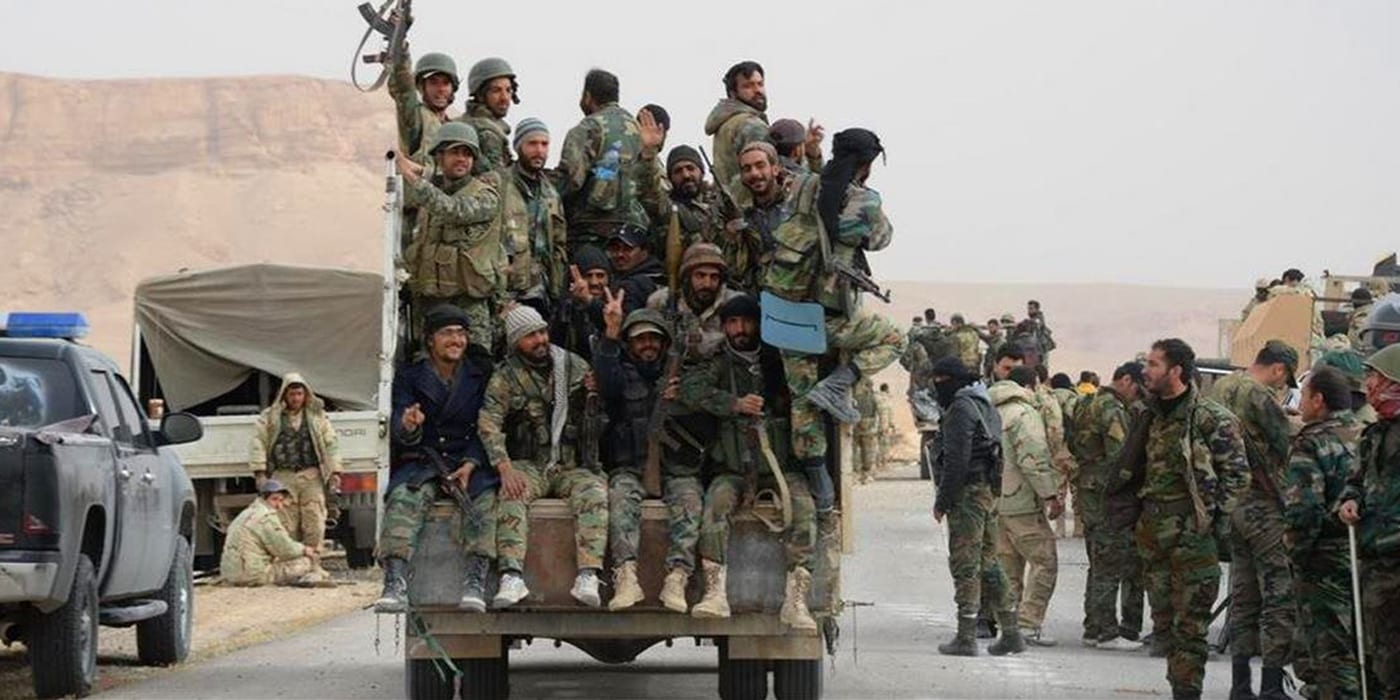
Moderate Wing of the Syrian Opposition (4)
In fourth place we find the relatively more moderate wing of the Syrian Opposition, including those military elements which do not favour the radical Salafists. This group will have an important role to play; they will have the support of Turkey and would be willing to negotiate a settlement in good faith. They will be key towards helping to end the war and to serve Erdogan’s goals for northwestern Syria.
Syrian Kurd Militia (5)
The fifth position has been earned by the Syrian Kurd militia forces, which have proven to be an effective group of fighters. Unfortunately for them, they are without a doubt about to suffer another treachery in a long line of historical betrayals. Someone ought to give the Kurdish leadership a copy of Thucydides’ “The History of the Peloponnesian War” and tell them to read the Melian Dialogue. Hopefully they will never again rely on a great power to help defend them.
The U.S. will abandon the Kurds, as is necessary, to assuage Turkey in hopes of maintaining its loyalty to NATO. The U.S. need for the Kurds as its “boots on the ground” element ended the minute the Islamic State was disabled as a strategic threat. Turkey, for its part, will insist on crushing all armed Kurdish groups and will aim for the destruction of any last vestige of a Kurdish homeland near the Syria-Turkey border.
Russia, like the U.S., will no longer see a need for Kurdish fighters, while Assad will not want an effective armed group in Syria that he has no hope of controlling. Still, the Kurds will not go gentle into that good night. They will rage against the dying of the light, and likely surprise the other players with their resilient might.
United States (6)
Coming in at a distant sixth is the United States whose influence in the region is at its lowest since, at least, the end of the First Gulf War. The last three administrations have made a mess of Syria, the rest of the Middle East and North Africa. In the region, Americans are seen as brutish, unreliable, hypocritical, arrogant and ignorant – a combination of traits that made the U.S. an almost forgotten player in any Syria peace negotiations.
Nevertheless, the United States can never be completely ignored, as it might suddenly decide to wield its massive power for good, or ill. And, with the mercurial personality of Donald Trump, it would be unwise to base any predictions on logic. If for no other reason, the U.S. may decide to act in order to check Iran or defend Israel.
And the Rest
The radical Jihadis will be dealt with and marginalized, although they can certainly never be completely eliminated. However, it is possible to push them to the point where they no longer present an existential threat on the strategic plane.
At the same time, the European Union will be no more than a cash cow used for reconstruction funding, much of which will be wasted or stolen by other unscrupulous players. As angry as this may make EU citizens, the European Union will cough up the funding regardless just to forestall another massive wave of migrants.
The strong do what they can and the weak suffer what they must”
-Thucydides
A Hard Proposal: The Syrian Solution
The key to saving the lives of thousands, or even millions, in the Idlib enclave while allowing for the return of others from Lebanon and Turkey lies in feeding the beast. Any deal must depend upon giving the main players something more than what could be gained without an agreement.
In the first instance, the top priorities of Vladimir Putin and Recep Erdogan must be addressed.
Russia seeks to be the main player in Syria. It has substantially achieved this, but will want to secure a few more areas for its puppet, Bashar al-Assad. This includes ensuring the safety of major Russian bases of operation, such as those at Latakia and Tartus. Russia must also secure supply routes to Aleppo, and it most certainly needs to control the Syrian oil fields.
Additionally, areas of rebel control in the south along the Jordanian border must be eliminated. This can be accomplished by land swaps and further relocation of populations. The Opposition will have to give up the southern enclaves, and its people must be relocated to Idlib Province. At the same time, it will have to relinquish territory in the southern part of the Idlib enclave which seems to be the objective of the current government offensive.
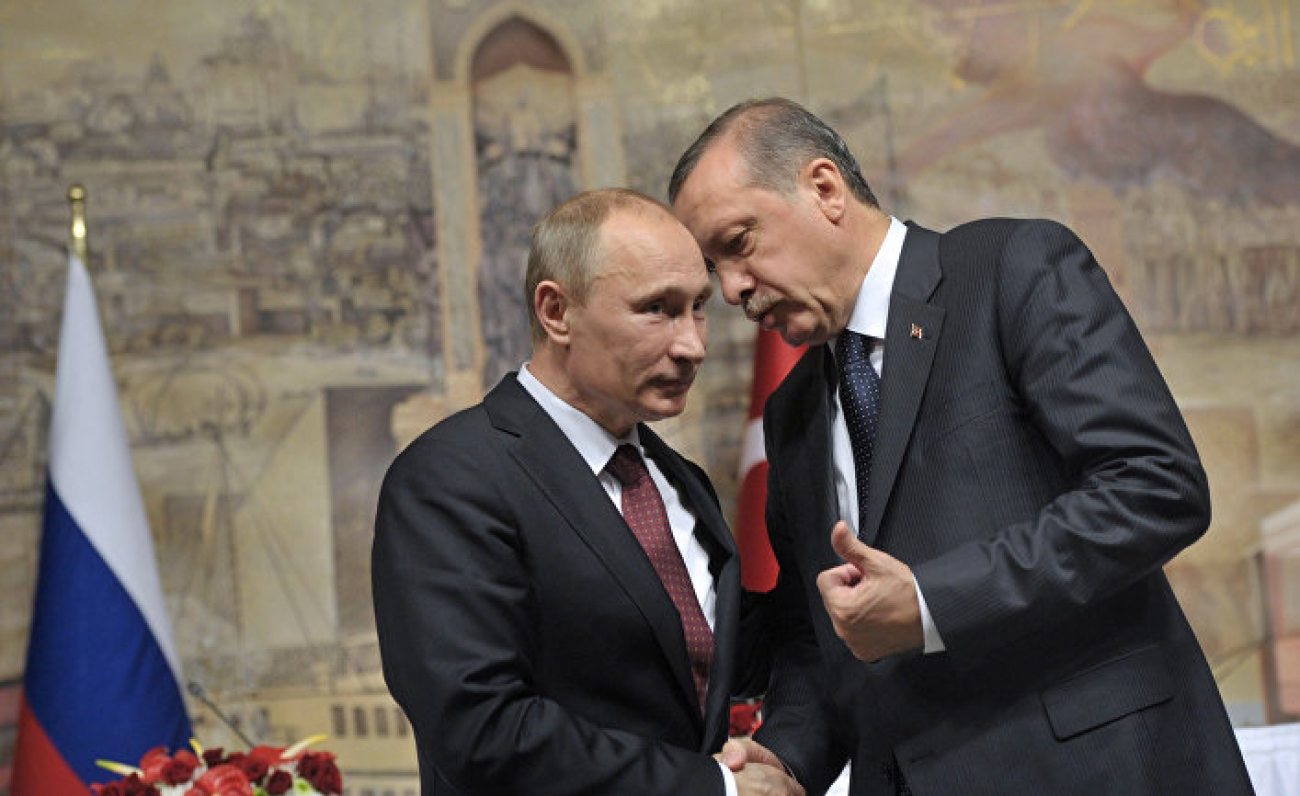
All of these territorial exchanges are dependent upon something that will rightfully enrage some international observers, and most certainly the YPG. This includes the designation of Idlib Province and border areas as a formal Turkish protectorate with the possibility they might someday be annexed by Turkey through a popular referendum.
The land swap must feed Erdogan’s vision of recovering some Ottoman territory. Yet even more important, it must give him a free hand to oppose the Kurdish forces along as much of Turkey’s southern border as possible.
This is supremely unfair to the Kurds, and they will resist with the courage they have already shown in the Syrian Civil War. In the end, however, they will once again fall victim to great power politics. Assad may oppose this deal, but Putin has ways to gain his acquiescence, or elimination, if necessary.
While international opinion may view Turkish acquisition of part of Syria and the betrayal of the Kurds very negatively, there is little doubt that any proposed action by the United Nations Security Council (UNSC) will be blocked by Russia. No other effective action is likely since the purpose of the agreement is to save Syrian lives and stop the war. Through this course, Putin would not just gain the added benefit of Erdogan as an ally on past and future territorial acquisitions, but he will also gain the solidifying of their alliance and the further distancing of Turkey from NATO.
It is not love, or morality, or international law that determines the outcome of world affairs, but the changing distribution of organized force”
― William Woodruff
In addition to the Kurds, Iran will also be counted amongst the losers in this agreement.
Yet, Iran holds significant importance to Putin and Assad. It will be given a seat at the table. This will ensure access to secure routes of resupply to Iran’s Shiite allies in Lebanon, as well as the Damascus coalition’s diplomatic support in Iran’s continuing confrontation with the U.S.
“The Protectorate”
The more moderate, pseudo-democratic Syrian Opposition forces who participated in the Astana talks, and who for the most part did not engage on the battlefield with Russian forces, have good relations with Turkey. They will benefit greatly from becoming Erdogan’s favoured clients in what could become known as “The Protectorate.”
These groups would play a leadership role not only in governing but also in organizing reconstruction and the return and resettlement of many thousands of refugees from abroad. There will, of course, be a cost for Turkey’s support.
First, their fighters will have to work directly with Turkish forces to eliminate the many radical Jihadist formations within their territories. This is a necessary but bloody task. It is necessary because so long as there is one fighter willing to take offensive actions against the Russian, Iranian and Damascus forces, there will always be an excuse to renew the air and ground campaigns. If the Jihadis refuse to be disarmed, as is likely, they will have to be neutralized or at least driven out of The Protectorate where they can be dealt with by others.
Both the Turks and the Syrian Opposition can expect widespread international support in this effort, assuming that media access to these acts remains restricted. A more distasteful task may be a requirement to aid Turkey against the battle-hardened and immensely capable Kurdish YPG.
As to the plight of the Syrian Kurds, there is really nothing in the proposed agreement for them. Undoubtedly, they will come under increasing attacks from the Turkish military and perhaps even by Russian and Syrian government forces. Regrettably, their interests are likely to be sacrificed. This is shameful but almost inevitable.
Sometimes, a war saves people.”
― Jose Ramos-Horta
The wild card is still the United States and what President Trump considers as being in his best re-election interest. Trump campaigned in 2016 on lessening American military involvement abroad. Yet so far he has been unable to extract U.S. forces from America’s many violent entanglements. Although this is not a popular position among some international observers, for the sake of peace in Syria, it is probably best that Trump follow his initial instincts and the U.S. withdraws all military personnel from Syrian territory.

It’s time for the U.S. to cut its losses and stop creating false expectations, expectations that began with America’s Ambassador to Syria Robert Ford (2010-2014) taking to the streets in the beginning to support Opposition demonstrators. President Trump can claim the fulfillment of a campaign promise and can probably even work with President Putin to help secure the assistance of America’s ally, Israel.
An Ugly Peace
One of the common characteristics of any effective peace agreement is that it is ugly. The major decision makers pick winners and losers and work primarily to secure their own best interests.
A negotiated settlement in Syria will be no different. Yet, it will hopefully save many lives and perhaps, even lead to the realization that there must be an international solution for the Kurds and great power agreements on other intractable problems in the region.
In the end, to paraphrase Otto von Bismarck’s immortal words, “Peace is like sausages. It’s better not to see it being made.”
John Sjoholm and William Stuebner, for LIMA CHARLIE WORLD
[Additional edits by Anthony A. LoPresti] [Main Image: Photo by Bulent Kilic]
[Subscribe to our newsletter for free and be the first to get Lima Charlie World updates delivered right to your inbox.]
John Sjoholm is Lima Charlie’s Middle East Bureau Chief, Managing Editor, and founder of the consulting firm Erudite Group. A seasoned expert on Middle East and North Africa matters, he has a background in security contracting and has served as a geopolitical advisor to regional leaders. He was educated in religion and languages in Sana’a, Yemen, and Cairo, Egypt, and has lived in the region since 2005, contributing to numerous Western-supported stabilisation projects. He currently resides in Jordan. Follow John on Twitter @JohnSjoholmLC
William Stuebner served in the United States Army for twenty years, first in the Infantry and then as a military intelligence officer. The last five years of his career revolved around the wars in Central America where he first led a special intelligence team and then worked as the El Salvador desk officer for the Department of Defense. He was also an assistant professor in the Social Sciences Department of the United States Military Academy where he taught politics and political philosophy.
Stuebner’s Balkans work began in May 1992, shortly after the commencement of hostilities in Bosnia and Herzegovina and continues to this day. His assignments included: Humanitarian Assistance Officer for the Department of Defense; Bosnian Field Representative for the Office of Foreign Disaster Assistance, United States Agency for International Development; Expert on Mission, Office of the Prosecutor, International Criminal Tribunal for the Former Yugoslavia (twice); Senior Deputy Head of Mission for Human Rights and Chief of Staff, Organization for Security and Cooperation in Europe Mission to Bosnia and Herzegovina. He has also headed two Non-Governmental Organizations dealing with international criminal justice and peace building.
Lima Charlie World provides global news, featuring insight & analysis by military veterans, intelligence professionals and foreign policy experts Worldwide.
For up-to-date news, please follow us on twitter at @LimaCharlieNews
In case you missed it:

![STRATEGIC OPTION | Syrian Endgame - The Hard Truth [Lima Charlie News][Photo: Bulent Kilic]](https://limacharlienews.com/wp-content/uploads/2019/05/STRATEGIC-OPTION-Syrian-Endgame-e1558501175322.png)
